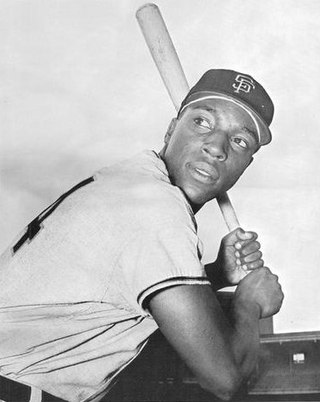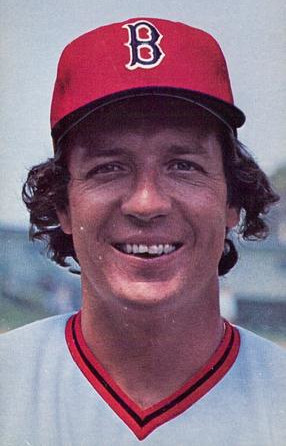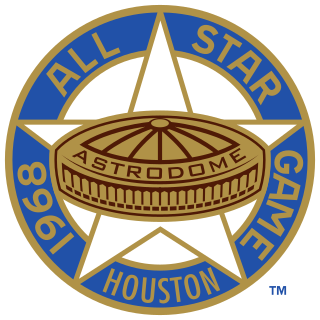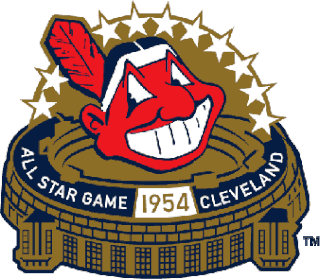
Willie Lee McCovey, nicknamed "Stretch", "Mac" and "Willie Mac", was an American professional baseball player. He played in Major League Baseball as a first baseman from 1959 to 1980, most notably as a member of the San Francisco Giants for whom he played for 19 seasons. McCovey also played for the San Diego Padres and Oakland Athletics in the latter part of his MLB career.

Richard Raymond Radatz was an American relief pitcher in Major League Baseball. Nicknamed "The Monster", the 6 ft 6 in (1.98 m), 230 lb (100 kg) right-hander had a scorching but short-lived period of dominance for the Boston Red Sox in the early 1960s. He got his nickname by striking out several New York Yankees in a row at a game in Fenway Park in 1963.

Ronald Ames Guidry, nicknamed "Louisiana Lightning" and "Gator", is an American former professional baseball pitcher who played 14 seasons in Major League Baseball (MLB) for the New York Yankees. Guidry was also the pitching coach of the Yankees from 2006 to 2007.
The 1962 World Series was the championship series of Major League Baseball's (MLB) 1962 season. The 59th edition of the World Series, it was a best-of-seven playoff that matched the defending American League (AL) and World Series champion New York Yankees against the National League (NL) champion San Francisco Giants. The Yankees won the series in seven games for the 20th championship in team history. It is best remembered for its dramatic conclusion in Game 7; with runners on second and third base and two outs in the bottom of the ninth inning, the Giants’ Willie McCovey hit a hard line drive that was caught by Yankees second baseman Bobby Richardson to preserve New York's one-run victory. Yankees pitcher Ralph Terry was named the World Series Most Valuable Player.

Melvin Leon Stottlemyre Sr. was an American professional baseball pitcher and pitching coach. He played for 11 seasons in Major League Baseball, all for the New York Yankees, and coached for 23 seasons, for the Yankees, New York Mets, Houston Astros, and Seattle Mariners. He was a five-time MLB All-Star as a player and a five-time World Series champion as a coach.

Richard Charles Wise is an American former professional baseball player and coach. He played in Major League Baseball as a right-handed pitcher between 1964 and 1982 for the Philadelphia Phillies, St. Louis Cardinals, Boston Red Sox, Cleveland Indians and the San Diego Padres. The two-time National League All-Star pitched a no-hitter on June 23, 1971 - and slugged two home runs to support his own effort. Wise was the winning pitcher for the Boston Red Sox in Game 6 of the 1975 World Series, considered by some to be the greatest Series game ever played.
The following are the baseball events of the year 1969 throughout the world.

The ceremonial first pitch is a longstanding ritual of baseball in which a guest of honor throws a ball to mark the end of pregame festivities and the start of the game. Originally, the guest threw a ball from their seat in the grandstand to the pitcher or catcher of the home team, but the ritual changed after United States President Ronald Reagan threw the first pitch on the field at an unscheduled appearance at a Baltimore Orioles game. Now, the guest stands on or in front of the pitcher's mound and throws towards home plate. The ceremonial thrower sometimes stands on the mound. The recipient of the pitch is usually a player from the home team.

The St. Louis Cardinals 1998 season was the team's 117th season in St. Louis, Missouri and the 107th season in the National League. The Cardinals went 83–79 during the season and finished third in the National League Central division, 18 games behind the Houston Astros. First baseman Mark McGwire broke Roger Maris' single-season home run record this season by hitting 70 home runs, battling with the Chicago Cubs' Sammy Sosa, who finished runner-up in the National League with 66.
Jack E. Hiatt is an American former professional baseball player and minor league manager. He played in Major League Baseball as a catcher from 1964 to 1972, most prominently as a member of the San Francisco Giants. After his playing career, he managed in the minor leagues before serving as the Giants' director of player development.
The 1981 Montreal Expos season was the 13th season in franchise history. They made it to the postseason for the first time in franchise history. Their playoff run ended in the NLCS against the Los Angeles Dodgers, with Rick Monday hitting a ninth-inning solo home run in game 5, subsequently referred to as "Blue Monday" by Expos fans. This was the closest the Expos ever got to a World Series appearance while in Montreal.
The 1962 San Francisco Giants season was the Giants' 80th year in Major League Baseball, their fifth year in San Francisco since their move from New York following the 1957 season, and their third at Candlestick Park. The team finished in first place in the National League with a record of 103 wins and 62 losses. They finished the season tied with their arch-rivals, the Los Angeles Dodgers, for first place in the league, necessitating a three-game tiebreaker playoff to determine the pennant winner. The Giants won two of the three games to take their first National League title since moving to San Francisco, making the Giants the first NL Champions of the 162-game schedule era. They went on to the 1962 World Series, where they lost in seven games to the New York Yankees. The Giants had 1,552 hits in the regular season, the most in the club's San Francisco era.
The 1963 San Francisco Giants season was the Giants' 81st year in Major League Baseball, their sixth year in San Francisco since their move from New York following the 1957 season, and their fourth at Candlestick Park. The team finished in third place in the National League with an 88–74 record, 11 games behind the Los Angeles Dodgers.
The 1969 San Francisco Giants season was the Giants' 87th season in Major League Baseball, their 12th season in San Francisco since their move from New York following the 1957 season, and their tenth at Candlestick Park. The team finished second in the newly established National League West with a record of 90–72, 3 games behind the Atlanta Braves, their fifth consecutive season of finishing second. The Giants set a Major League record which still stands for the most double plays grounded into by a team in a single game, with 7 against the Houston Astros on May 4.
The 1963 Major League Baseball season was contested from April 8 to October 6, 1963. The American League and National League both featured ten teams, with each team playing a 162-game schedule.

The 1970 Major League Baseball All-Star Game was the 41st midseason exhibition between the all-stars of the American League (AL) and the National League (NL), the two leagues comprising Major League Baseball. The game was played on the evening of July 14, 1970, at Riverfront Stadium in Cincinnati, Ohio, home of the Cincinnati Reds of the National League, and resulted in a 5–4 victory for the NL.

The 1968 Major League Baseball All-Star Game was the 39th playing of the midsummer classic between the all-stars of the American League (AL) and National League (NL), the two leagues comprising Major League Baseball.

The 1966 Major League Baseball All-Star Game was the 37th midseason exhibition between the all-stars of the American League (AL) and the National League (NL), the two leagues comprising Major League Baseball. The game was played on July 12, 1966, at then-new Busch Memorial Stadium in St. Louis, Missouri, home of the St. Louis Cardinals of the National League.

The 1954 Major League Baseball All-Star Game was the 21st playing of the midsummer classic between the all-stars of the American League (AL) and National League (NL), the two leagues comprising Major League Baseball. The game was held on July 13, 1954, at Cleveland Municipal Stadium in Cleveland, Ohio, the home of the Cleveland Indians of the American League.
The 1958 Major League Baseball All-Star Game was the 25th playing of the midsummer classic between the all-stars of the American League (AL) and National League (NL), the two leagues comprising Major League Baseball. The game was held on July 8, 1958, at Memorial Stadium in Baltimore, Maryland, the home of the Baltimore Orioles of the American League.












